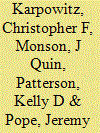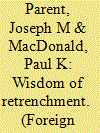| Srl | Item |
| 1 |
ID:
111960


|
|
|
|
|
| Publication |
2012.
|
| Summary/Abstract |
In the summer of 2010, 52 Republican members of the US House of Representatives joined the newly formed Tea Party Caucus, bringing the first institutional voice to the Tea Party movement. To understand both the policy orientations of the organized Tea Party (in its caucus manifestation) and the institutional strength of the caucus's membership, we assess the extent to which caucus members are distinctive from their fellow Republicans in the US House of Representatives. Our results suggest that membership in the caucus is primarily driven by ideology and economics. Specifically, we find that Tea Party Caucus members are Republicans who are ideologically oriented toward limited government and lower taxes and who hail from particularly prosperous congressional districts. We find no evidence that Tea Party Caucus members serve safer districts or have greater seniority or institutional stature than their Republican colleagues who are not members of the caucus. These findings, we believe, speak not only to the nature and orientations of the Tea Party Caucus, but to the wider Tea Party movement itself.
|
|
|
|
|
|
|
|
|
|
|
|
|
|
|
|
| 2 |
ID:
105421


|
|
|
|
|
| Publication |
2011.
|
| Summary/Abstract |
By winning the presidency and strengthening its majority in both chambers of Congress, the 2008 election gave control of the government to the Democratic Party. However, as the 2010 election season unfolded, the news for the Democratic Party could not have been much worse. Economic conditions had not improved dramatically. A bitter and lengthy fight over health care reform signaled to citizens that little had changed in how Washington, DC, governed. The stimulus package and its impact on the federal debt caused unease in a segment of the electorate that was concerned with the size of government. In this context, observers of American politics began to take note of the number of citizens affiliating with, or at least expressing favorability toward, a loose coalition of groups known as the Tea Party movement. Tea Party rallies began to occur throughout the United States, seeking to draw attention to the movement's primary issues.
|
|
|
|
|
|
|
|
|
|
|
|
|
|
|
|
| 3 |
ID:
107595


|
|
|
|
|
| Publication |
2011.
|
| Summary/Abstract |
The United States can no longer afford a world-spanning foreign policy. Retrenchment -- cutting military spending, redefining foreign priorities, and shifting more of the defense burden to allies -- is the only sensible course. Luckily, that does not have to spell instability abroad. History shows that pausing to recharge national batteries can renew a dominant power's international legitimacy.
|
|
|
|
|
|
|
|
|
|
|
|
|
|
|
|